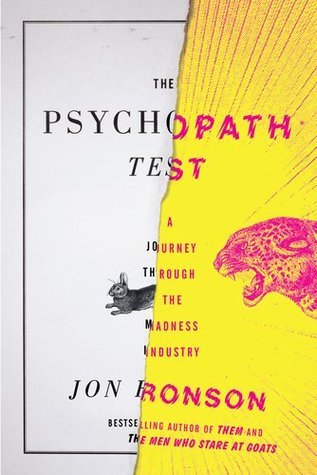
The Psychopath Test: A Journey Through the Madness Industry
Publisher
Riverhead Books
Publication Date
5/12/2011
ISBN
9781594488016
Pages
288
Categories
About the Author
Questions & Answers
The "madness industry" refers to the complex interplay of psychiatry, psychology, media, and society that shapes our understanding of mental disorders. It is characterized by a few key aspects:
- Medicalization: The process of labeling more behaviors as mental disorders, often influenced by pharmaceutical companies and advocacy groups.
- Overdiagnosis: The tendency to diagnose disorders in individuals who may not actually meet the criteria, leading to overmedication and stigmatization.
- Misdiagnosis: Incorrectly diagnosing individuals, which can lead to inappropriate treatment and further distress.
- Media Influence: The media often portrays mental illness in sensationalized ways, contributing to stigma and misunderstanding.
- Professional Bias: Psychiatrists and psychologists may have biases that influence their diagnoses and treatment approaches.
This industry influences our understanding of mental disorders by:
- Shaping public perception and awareness.
- Influencing policy and treatment guidelines.
- Potentially leading to inappropriate treatment and labeling of individuals.
The concept of "psychopathy" evolves throughout the book from a relatively obscure term to a significant factor in understanding human behavior and societal issues. Initially, it's described as a rare condition characterized by a lack of impulse control and violence, often associated with serial killers. However, the book explores the idea that psychopathy might be more prevalent than previously thought, especially in high-stress environments like prisons and corporations.
The diagnosis and treatment of psychopathy are complex. The Bob Hare Checklist is presented as a tool for identifying psychopaths, but it's acknowledged that the diagnosis is not without controversy and can be subject to bias. The book also examines the effectiveness of treatments like cognitive behavioral therapy and chemical castration, highlighting the challenges in treating psychopathy and the potential for misuse of the diagnosis. The implications include the possibility that psychopathy plays a role in societal problems like economic injustice and war, suggesting that understanding and addressing psychopathy could be crucial for creating a more just and peaceful society.
The ethical considerations surrounding psychopathy tests and labeling are significant. Firstly, there's the potential for misdiagnosis, as the tests are not infallible and can lead to incorrect labeling, causing long-term stigma and affecting employment opportunities. Secondly, the tests can be misused for profiling and discrimination, as seen in the case of the PCL-R, which has been used to label individuals as violent predators without sufficient evidence. Thirdly, there's the issue of consent and privacy, as individuals may be tested without their knowledge or consent. Lastly, the labeling of individuals as psychopaths can lead to a lack of empathy and understanding, potentially exacerbating their behavior due to the belief that they are untreatable and unchangeable.
The book challenges the traditional view of mental illness and psychiatry in several ways. It questions the reliability of psychiatric diagnoses, highlighting the potential for misdiagnosis and the influence of checklists like the DSM-IV-TR. It explores the idea that some individuals, like Tony, may fake mental illness for personal gain, suggesting that psychiatric diagnoses are not always accurate. The book also criticizes the over-diagnosis of conditions like autism, attention deficit disorder, and childhood bipolar disorder, arguing that these diagnoses may be applied to normal behaviors. Furthermore, it scrutinizes the role of psychiatry in society, questioning its effectiveness and the potential for abuse, as seen in the case of the Coalinga State Hospital. Overall, the book challenges the authority and reliability of psychiatry, suggesting that mental illness and its treatment are more complex and nuanced than commonly portrayed.
Being labeled as mentally ill or a psychopath can have significant personal and societal consequences. On a personal level, such a label can lead to stigma, discrimination, and social isolation. Individuals may face challenges in employment, relationships, and accessing healthcare. For those diagnosed as psychopaths, the label can be particularly stigmatizing, as it suggests a lack of empathy and a propensity for criminal behavior, which can make it difficult to gain trust and form meaningful connections.
Societally, the labeling of mental illness or psychopathy can lead to overdiagnosis and misdiagnosis, as well as the potential for abuse of the diagnostic process. This can result in inappropriate treatment, labeling of normal behaviors as disorders, and the overmedication of individuals. Additionally, the labeling can contribute to a societal perception that mental illness is a moral failing, rather than a medical condition, which can exacerbate stigma and discrimination.
